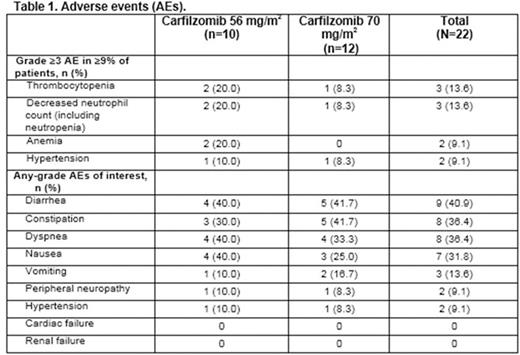Abstract

Background: The combination of carfilzomib with lenalidomide and dexamethasone (KRd) is approved in the United States and the European Union (EU) for the treatment of patients with relapsed or refractory multiple myeloma (RRMM). Under these approvals, carfilzomib is administered twice weekly as a 10-minute intravenous (IV) infusion at a dose of 20/27 mg/m2. The phase 1/2 CHAMPION-1 study showed that once-weekly carfilzomib (20/70 mg/m2; 30-minute IV infusion) with dexamethasone was well tolerated and active in patients with RRMM (Berenson et al. Blood. 2016;127:3360−3368). We present initial results from the dose evaluation component of a phase 1b study (NCT02335983) assessing the safety and efficacy of once-weekly carfilzomib with lenalidomide and dexamethasone in patients with MM.
Methods: This is an open-label, multicenter, dose-finding, phase 1b study.The primary objective of the study is to evaluate the safety and tolerability of a once-weekly KRd regimen. Secondary objectives included evaluation of the efficacy of a once-weekly KRd regimen. This study consists of 2 parts: a dose-evaluation component in patients with RRMM and a dose-expansion component in both RRMM and newly diagnosed MM (NDMM). Results from the ongoing dose-evaluation component in RRMM are presented.
There were 2 planned dose cohorts in the dose-evaluation portion of the study: carfilzomib 56 mg/m2 KRd cohort (56 mg/m2) and carfilzomib 70 mg/m2 KRdcohort (70 mg/m2). All patients received carfilzomib (days 1, 8, and 15), lenalidomide 25 mg (days 1 - 21), and dexamethasone 40 mg (days 1, 8, 15 and 22) on a 28-day cycle (dexamethasone was not administered on day 22 for cycles 9+). Carfilzomib was administered as a 30-minute IV infusion: 20 mg/m2 on cycle 1 day 1 with escalation to the assigned dose level (56 or 70 mg/m2) thereafter. The protocol allowed 8 DLT-evaluable patients to be treated in the 56 mg/m2 and 70 mg/m2 cohorts. Response was assessed by investigators using International Myeloma Working Group Uniform Response Criteria. The data cutoff date for this analysis was June 23, 2016.
Results: A total of 22 patients (56 mg/m2, n=10; 70 mg/m2, n=12) with a median age of 69 (range, 50-87) years were enrolled in the dose evaluation component of the study. The median number of prior regimens was 1 (range, 1 - 3) in both cohorts. There were no dose-limiting toxicities observed in any of the 15 dose-evaluable RRMM patients (56 mg/m2 cohort, n=8; 70 mg/m2 cohort, n=7). The median number of cycles started as of data cutoff was 9.5 (range, 3-15) in the 56 mg/m2 cohort and 6.0 (range, 2-9) in the 70 mg/m2 cohort. All patients experienced at least 1 treatment-emergent adverse event (AE). Grade ≥3 AEs occurring in ≥9% of patients, and any AE of interest are shown in Table 1. The only grade ≥3 AEs to occur in ≥2 patients (≥9%) were thrombocytopenia (56 mg/m2, n=2; 70 mg/m2, n=1), decreased neutrophil count (56 mg/m2, n=2; 70 mg/m2, n=1), anemia (56 mg/m2, n=2), and hypertension (56 mg/m2, n=1; 70 mg/m2, n=1). Although the numbers were small, there was no apparent difference in the incidence of dyspnea or hypertension between the 56 and 70 mg/m2 cohorts. Cardiac or renal failure of any grade was not reported at the time of the database snapshot in these patients with RRMM. Response rates after 4 cycles, as assessed by investigators, are shown in Table 2. Two patients in the 56 mg/m2 cohort did not complete 4 cycles: an 87-year old patient developed asymptomatic pulmonary hypertension (detected on a required echocardiogram study) and was taken off therapy; another patient withdrew consent. One patient in the 70 mg/m2 cohort had a partial response after cycle 1 but was found to have progressive disease in cycle 3 (listed as did not complete 4 cycles in Table 2). After 4 cycles, the response rates (investigator assessed), were 70% and 75% in the 56 and 70 mg/m2 cohorts (response assessment for 2 patients in the 70 mg/m2 cohort was missing at the time of the data cutoff).
Conclusions: These results demonstrate that carfilzomib administered in a convenient once-weekly schedule in combination with lenalidomide and dexamethasone in patients with RRMM is safe with promising efficacy. The 70 mg/m2 dosing was selected for dose-expansion cohorts in RRMM and NDMM. An update on the expansion cohorts will be presented at the meeting.
Biran:Onyx: Consultancy, Speakers Bureau; Celgene: Consultancy, Speakers Bureau. Siegel:Novartis: Honoraria, Speakers Bureau; Amgen: Honoraria, Speakers Bureau; Merck: Honoraria; BMS: Honoraria, Speakers Bureau; Celgene: Honoraria, Speakers Bureau; Takeda: Honoraria, Speakers Bureau. Berdeja:Abbvie, Acetylon, Amgen, Bluebird, BMS, Calithera, Celgene, Constellation, Curis, Epizyme, Janssen, Karyopharm, Kesios, Novartis, Onyx, Takeda, Tragara: Research Funding. Faber:Celgene: Speakers Bureau; Cardinal Health: Honoraria; Gilead: Consultancy, Honoraria. Seneviratne:Novartis Pharmaceuticals: Speakers Bureau. Alsina:Onyx: Speakers Bureau; Millenium Pharmaceuticals: Research Funding; Novartis: Research Funding; Signal Genetics: Consultancy; Onyx: Consultancy. Bensinger:Celgene: Consultancy, Honoraria, Research Funding, Speakers Bureau; Amgen: Honoraria, Research Funding, Speakers Bureau. Kimball:Amgen Inc.: Employment, Equity Ownership. Zhou:Amgen Inc.: Employment, Equity Ownership. Landgren:BMS: Honoraria; Takeda: Honoraria; Novartis: Honoraria; Amgen: Honoraria, Research Funding; Celgene: Honoraria, Research Funding.
Author notes
Asterisk with author names denotes non-ASH members.

This icon denotes a clinically relevant abstract



This feature is available to Subscribers Only
Sign In or Create an Account Close Modal